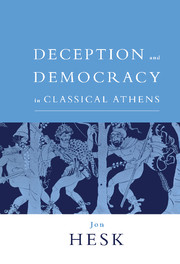Book contents
- Frontmatter
- Contents
- Preface
- Prologue
- 1 Deception and the rhetoric of Athenian identity
- 2 Deceiving the enemy: negotiation and anxiety
- 3 Athens and the ‘noble lie’
- 4 The rhetoric of anti-rhetoric: Athenian oratory
- 5 Thinking with the rhetoric of anti-rhetoric
- Epilogue
- Bibliography
- Index locorum
- General index
3 - Athens and the ‘noble lie’
Published online by Cambridge University Press: 22 September 2009
- Frontmatter
- Contents
- Preface
- Prologue
- 1 Deception and the rhetoric of Athenian identity
- 2 Deceiving the enemy: negotiation and anxiety
- 3 Athens and the ‘noble lie’
- 4 The rhetoric of anti-rhetoric: Athenian oratory
- 5 Thinking with the rhetoric of anti-rhetoric
- Epilogue
- Bibliography
- Index locorum
- General index
Summary
I am only taking up one of the fundamental problems of western philosophy when it poses these questions: why, in fact, are we attached to the truth? Why the truth rather than lies? Why the truth rather than myth? Why the truth rather than illusion? And I think that, instead of trying to find out what truth, as opposed to error, is, it might be interesting to take up the problem posed by Nietzsche: how is it that, in our societies, ‘the truth’ has been given this value, thus placing us absolutely under its thrall?
God does not stand aloof from just deception. There are occasions when God respects an opportune moment for lies.
In his essay ‘The Order of the Discourse’, Michel Foucault offers an outline of the character and focus of his future research. He proposes to identify the processes by which in our society discourse is ‘at once controlled, selected, organised, and redistributed by a certain number of procedures whose role it is to ward off its powers, to gain mastery over its chance events, to evade its ponderous, formidable materiality’. To this end, Foucault isolates three ‘principles of exclusion’. They are prohibition, the division between reason and madness and the rejection of the latter, and thirdly, the opposition between true and false.
According to Foucault, the third principle of exclusion finds its origin in the classical rejection of the sophist and the Platonic foundation of a ‘will to truth’ or ‘will to knowledge’.
- Type
- Chapter
- Information
- Deception and Democracy in Classical Athens , pp. 143 - 201Publisher: Cambridge University PressPrint publication year: 2000

